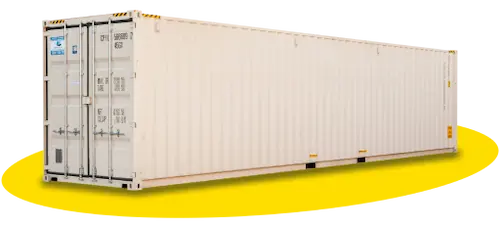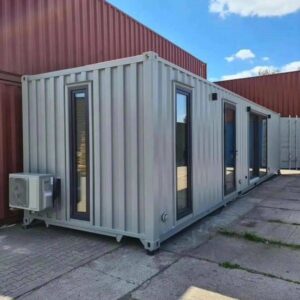When it comes to shipping perishable goods, pharmaceuticals, or any cargo that requires a controlled environment, refrigerated shipping containers—often called “reefers”—are the solution businesses rely on. These specialized containers maintain consistent temperature control, ensuring that your products arrive at their destination in optimal condition.
If you’re in the market for refrigerated shipping containers for sale, it’s important to understand the benefits, types, and considerations involved in purchasing one of these high-tech transport solutions. In this blog post, we’ll walk you through everything you need to know about refrigerated containers and how they can help improve your logistics operations.
What are Refrigerated Shipping Containers?
Refrigerated shipping containers are insulated containers equipped with refrigeration units that allow them to maintain a specific temperature range during transport. These units are designed to keep sensitive products safe during transit across long distances, whether by sea, land, or air. They’re commonly used in the transportation of:
- Fresh produce (fruits, vegetables, dairy, meat)
- Pharmaceuticals (vaccines, biologics, medicines)
- Flowers and plants
- Frozen foods
- Chemicals and other sensitive products
These containers come in various sizes, ranging from small 10-foot units to standard 20-foot and 40-foot containers, providing flexibility depending on your specific needs.
Why Choose a Refrigerated Shipping Container?
1. Temperature Control and Flexibility
Reefers provide unparalleled temperature control. The refrigeration system can maintain a wide range of temperatures, from freezing (-18°C or 0°F) to chilled (2°C–8°C or 35°F–46°F). This level of control is critical for preserving the integrity of your goods, particularly in industries like food distribution, pharmaceuticals, and biotechnology, where even slight fluctuations in temperature can lead to spoilage or compromised product efficacy.
2. Durability and Reliability
Refrigerated containers are built to withstand tough conditions. Whether shipping across seas, roads, or rails, they are designed to endure extreme temperatures, humidity, and even rough handling. With proper maintenance, a refrigerated container can last many years, offering a long-term solution to shipping challenges.
3. Cost-Effectiveness
Buying a refrigerated shipping container can be more cost-effective than renting one, especially for businesses with frequent shipping needs. The cost of purchasing a used or new container can be offset over time with regular use. Additionally, you won’t need to worry about recurring rental fees, which can add up over time.
4. Versatility in Use
Aside from transporting goods, refrigerated containers are used for a variety of other purposes. For example, they are often converted into cold storage facilities for businesses that need to store large quantities of perishable products on-site. They’re also popular in the hospitality and event industries, where they serve as mobile kitchens or refrigeration units for outdoor events and festivals.
Types of Refrigerated Shipping Containers for Sale
When purchasing refrigerated containers, you’ll encounter two primary types: new and used containers.
1. New Refrigerated Containers
- Pros: Brand new containers come with the latest features, enhanced energy efficiency, and full warranties. They are ideal for businesses that prioritize reliability and need the container to meet strict operational standards.
- Cons: New containers come with a higher price tag, which can be an obstacle for small businesses or startups on a budget.
2. Used Refrigerated Containers
- Pros: Used refrigerated containers are more affordable than new ones, making them an attractive option for businesses looking to cut costs. Many used containers are still in good condition and can serve your needs for many years if properly maintained.
- Cons: Used containers may have some wear and tear, and depending on their age, the refrigeration unit may not be as efficient as that in a new model. However, these containers are often refurbished, with new components installed to extend their lifespan.
Factors to Consider Before Purchasing a Refrigerated Container
When shopping for refrigerated containers for sale, there are several factors to take into account to ensure that you get the best product for your needs.
1. Size and Capacity
Refrigerated containers come in various sizes, but the most common are 20-foot and 40-foot units. The size you choose depends on the volume of goods you need to transport and store. Keep in mind that larger containers are more expensive and may not always be necessary for smaller shipments.
2. Power Source
Refrigerated containers require a power source to run the refrigeration unit. They typically run on diesel engines, but some newer models are powered by electricity or a combination of both. If your container will be used on the road, you’ll need a container with a diesel-powered refrigeration unit. If it’s stationary or used for storage, an electric-powered reefer might be more appropriate.
3. Temperature Range
Different types of goods require different temperature ranges. Before making your purchase, ensure the container can accommodate the temperature specifications needed for your products. Some reefers can be set to both freezing and chilled temperatures, while others are designed for a narrower range.
4. Condition and Age
When buying used containers, always ask about the age, usage history, and maintenance record. If possible, request a detailed inspection to check the overall condition of the container and the refrigeration system. Be sure that the container is free from structural damage and that the insulation is intact.
5. Location and Delivery
Consider where the refrigerated shipping container will be delivered and how it will be transported. Some sellers may offer delivery services, while others may require you to pick up the container yourself. Factor in any additional costs for shipping, as this can affect the overall price.
6. Cost
The cost of refrigerated containers varies based on the size, condition, and features. New containers typically range from $5,000 to $15,000 or more, while used units can start around $2,000 and go up depending on their condition and age. Be sure to compare prices from multiple vendors and consider the long-term benefits of each option.
Where to Buy Refrigerated Shipping Containers
Refrigerated containers are available through a variety of sources, including:
- Online marketplaces: Websites like eBay, Alibaba, and specialized shipping container suppliers often list new and used refrigerated containers for sale.
- Local suppliers: Many shipping container companies and manufacturers sell refrigerated units directly. They may also offer leasing or rental options.
- Auctions: Some government and private auctions may feature used refrigerated containers at competitive prices.
Conclusion
Purchasing refrigerated shipping containers can be a game-changer for businesses that rely on temperature-sensitive cargo. Whether you’re in the food, pharmaceutical, or chemicals industry, investing in a refrigerated container ensures the safe transport and storage of your goods while offering long-term value. By considering factors like size, power source, temperature range, and condition, you can find a refrigerated shipping container that fits your business needs and budget.
Do thorough research, compare prices, and make sure the container is in good working condition before making your purchase. Whether you choose a new or used unit, refrigerated containers are an excellent investment for any business looking to ensure the safe delivery of perishable goods.



